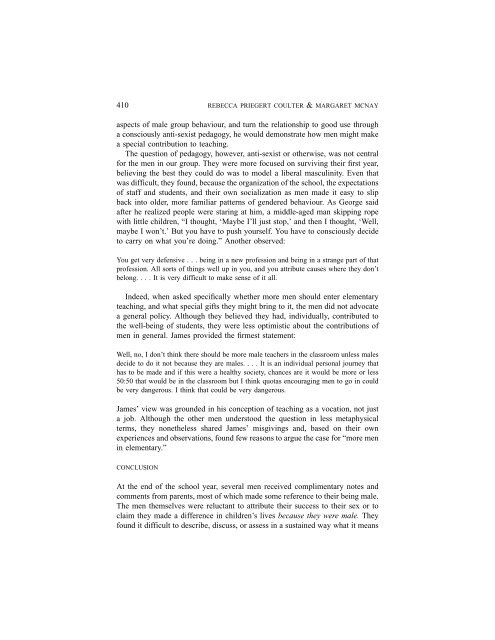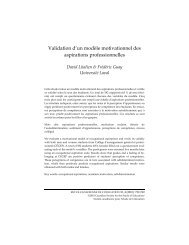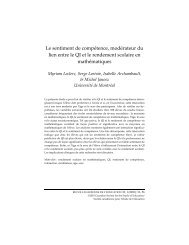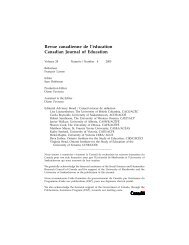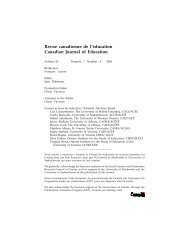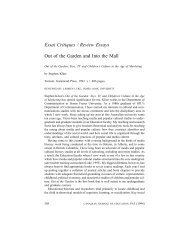Mireille Falardeau et Michel Loranger Le choix de stratégies ... - CSSE
Mireille Falardeau et Michel Loranger Le choix de stratégies ... - CSSE
Mireille Falardeau et Michel Loranger Le choix de stratégies ... - CSSE
You also want an ePaper? Increase the reach of your titles
YUMPU automatically turns print PDFs into web optimized ePapers that Google loves.
410 REBECCA PRIEGERT COULTER & MARGARET MCNAY<br />
aspects of male group behaviour, and turn the relationship to good use through<br />
a consciously anti-sexist pedagogy, he would <strong>de</strong>monstrate how men might make<br />
a special contribution to teaching.<br />
The question of pedagogy, however, anti-sexist or otherwise, was not central<br />
for the men in our group. They were more focused on surviving their first year,<br />
believing the best they could do was to mo<strong>de</strong>l a liberal masculinity. Even that<br />
was difficult, they found, because the organization of the school, the expectations<br />
of staff and stu<strong>de</strong>nts, and their own socialization as men ma<strong>de</strong> it easy to slip<br />
back into ol<strong>de</strong>r, more familiar patterns of gen<strong>de</strong>red behaviour. As George said<br />
after he realized people were staring at him, a middle-aged man skipping rope<br />
with little children, “I thought, ‘Maybe I’ll just stop,’ and then I thought, ‘Well,<br />
maybe I won’t.’ But you have to push yourself. You have to consciously <strong>de</strong>ci<strong>de</strong><br />
to carry on what you’re doing.” Another observed:<br />
You g<strong>et</strong> very <strong>de</strong>fensive . . . being in a new profession and being in a strange part of that<br />
profession. All sorts of things well up in you, and you attribute causes where they don’t<br />
belong. ...Itisvery difficult to make sense of it all.<br />
In<strong>de</strong>ed, when asked specifically wh<strong>et</strong>her more men should enter elementary<br />
teaching, and what special gifts they might bring to it, the men did not advocate<br />
a general policy. Although they believed they had, individually, contributed to<br />
the well-being of stu<strong>de</strong>nts, they were less optimistic about the contributions of<br />
men in general. James provi<strong>de</strong>d the firmest statement:<br />
Well, no, I don’t think there should be more male teachers in the classroom unless males<br />
<strong>de</strong>ci<strong>de</strong> to do it not because they are males. ...Itisanindividual personal journey that<br />
has to be ma<strong>de</strong> and if this were a healthy soci<strong>et</strong>y, chances are it would be more or less<br />
50:50 that would be in the classroom but I think quotas encouraging men to go in could<br />
be very dangerous. I think that could be very dangerous.<br />
James’ view was groun<strong>de</strong>d in his conception of teaching as a vocation, not just<br />
a job. Although the other men un<strong>de</strong>rstood the question in less m<strong>et</strong>aphysical<br />
terms, they non<strong>et</strong>heless shared James’ misgivings and, based on their own<br />
experiences and observations, found few reasons to argue the case for “more men<br />
in elementary.”<br />
CONCLUSION<br />
At the end of the school year, several men received complimentary notes and<br />
comments from parents, most of which ma<strong>de</strong> some reference to their being male.<br />
The men themselves were reluctant to attribute their success to their sex or to<br />
claim they ma<strong>de</strong> a difference in children’s lives because they were male. They<br />
found it difficult to <strong>de</strong>scribe, discuss, or assess in a sustained way what it means


